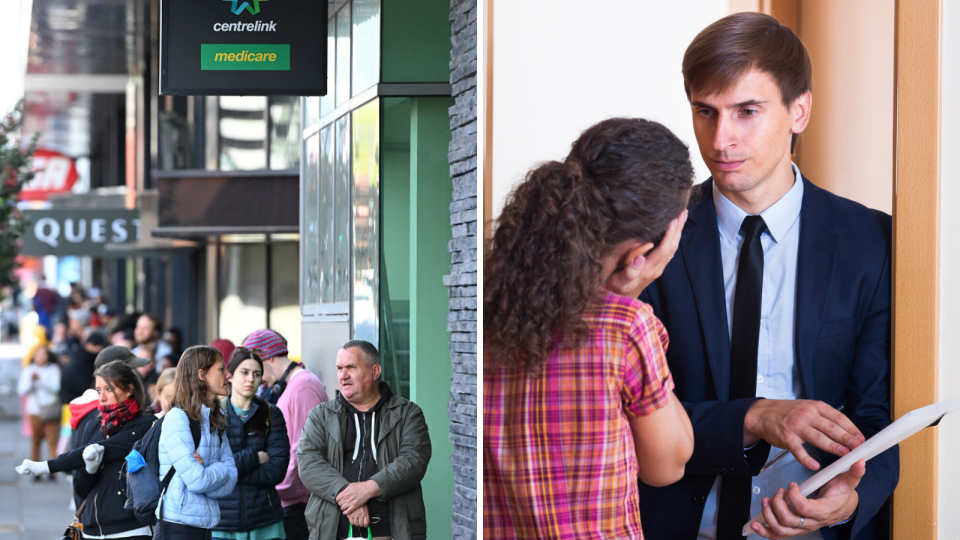What happens if my landlord won’t negotiate my rent?

As thousands of people lose their jobs under the economic strain of coronavirus, Aussies are turning to their landlords for rent relief.
And while some landlords will negotiate, not every landlord will be so accommodating.
Now's the time to negotiate: 4 ways to get yourself cheaper rent
Renters’ rights in a bushfire: What you need to know
If that’s the situation you’re in, there are some actions you can take:
Write a relief letter
The first thing you need to know is that you can’t force your landlord to bring the rent down, per se, but you can arrange a new agreement.
“There’s no legal avenue to pursue around negotiating rent. This isn't something you can go to the Tribunal for,” Tenants Union NSW senior policy officer Leo Patterson Ross told Yahoo Finance.
“[The landlord and the tenant] are free to make a deal together at any time. It can be a full reduction, a partial reduction, for a short or long period of time – whatever they agree.”
Tenants Union NSW has published a template for a relief letter that can help you put in writing your request to bring down the rent.
In the letter, express how Covid-19 has affected your income and your personal situation, and then point out that it will be difficult for your landlord to find a tenant during this time if you vacated.
You could also point out good rental history, timely payments, and the newly lowered rates of other similar properties in your area if you’ve noticed a drop.
In your letter, you can then propose a new rent rate for a certain period of time and add that you are open to discussing and revising the rate on a weekly/fortnightly/monthly basis.
Contact a politician
If that doesn’t work, you might need to turn to your local politician.
“Really, the best thing [renters] can do is to call their local MP and be like, ‘we need you to step in’,” said Ross.
Know your rights: Your landlord can’t evict you personally
As the law currently stands, tenants can’t get evicted unless they have a Notice to Vacate from their jurisdiction’s Tribunal (e.g. in NSW’s case it’s the NSW Civil & Administrative Tribunal). In the case of WA and Tasmania, this matter is settled before the courts.
And even then, you can’t be personally evicted by your landlord: the police will do it, but only if they have a notice.
You’ll generally be served a termination notice only after you have fallen behind on rent for 14 days. You can’t be served this notice before then, but check with your jurisdiction.
Here are all the tenant unions in every Australian state:
The Tenants Union of ACT has been defunded by the ACT Government.
With up to 1 million Australians estimated to be unemployed, state and federal governments are looking at implementing new laws soon that would afford protection for renters.
What are some state governments doing?
The NSW government has agreed to new laws that prevents landlords from evicting tenants from the rental property and from terminating the tenancy agreement.
So if you can’t make rent because you’ve fallen on financial hardship due to the virus, NSW renters won’t be forced into homelessness.
The COVID-19 Legislation Amendment (Emergency Measures) Bill 2020 was agreed to yesterday, but it has not passed into legislation because parliament is currently not sitting.
Instead, the bill provides special powers to NSW Minister for Better Regulation and Innovation Kevin Anderson to enact the legislation as state regulation. However, Yahoo Finance understands Anderson has not yet implemented the new rules as it is waiting on a National Cabinet meeting this Friday.
The Tasmanian Parliament is also debating similar legislation to protect renters from eviction for four months.
The COVID-19 Disease Emergency (Miscellaneous Provisions) Bill 2020 means renters will have to keep paying rent, but they won’t get kicked out.
It will also mean freezes on rent increases, as well as a pause on house inspections and maintenance repairs.
What the Federal Government’s doing
The National Cabinet will hold a meeting this Friday to discuss the approach to residential tenancies.
The Morrison government is reportedly considering income tax relief for landlords who reduce rent for tenants, according to AFR reports.
"This is obviously a complicated issue because you've got a tenant, you've got a landlord, you've got creditors and all of those issues and you need to solve for the entire chain that's there,” Morrison said on Tuesday.
More to come.
Make your money work with Yahoo Finance’s daily newsletter. Sign up here and stay on top of the latest money, news and tech news.
Follow Yahoo Finance Australia on Facebook, Twitter, Instagram and LinkedIn.

 Yahoo Finance
Yahoo Finance 
